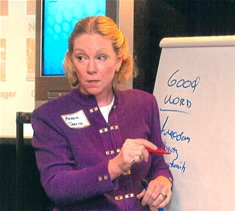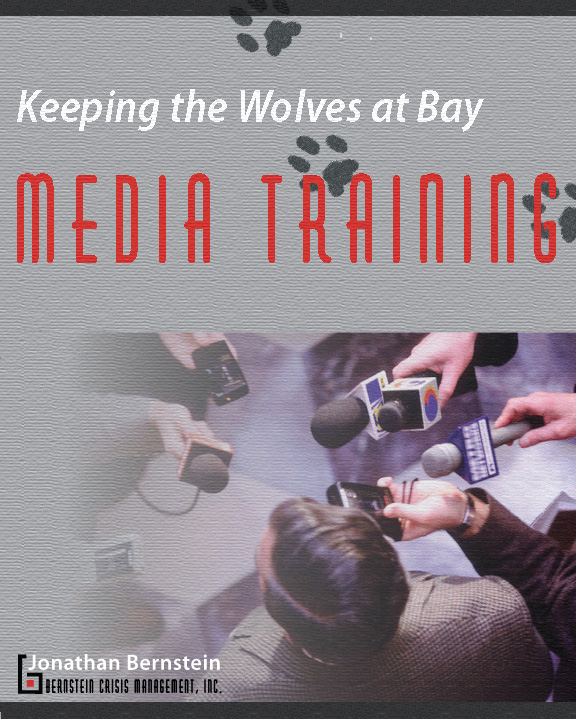JUST A THOUGHT
If you ask them, you'll find that your
stakeholders have information needs that might surprise you. Or, just wing it and surprise them.
|
|
|
FROM THE EDITOR
Merrie Spaeth graces the pages of Crisis Manager for the first time in an article as serious as her infamous Bimbo Awards are humorous. Merrie and I have some history together; we had the dubious distinction of being two of the consultants whose advice Arthur Andersen largely ignored. She's still in business. I'm still in business.
In Harmonic Convergence, Merrie makes a complicated subject simple by, de facto, posing the question, "Would you rather have your online reputation be associated with your beautifully written corporate values or with the terms 'vomit' and 'crap'?"
Then Australian crisis management pro Tony Jaques returns to us with an article from his own newsletter, posing the question, "Why Can't We Learn from Other People's Mistakes?"
It reminds me of the definition of insanity popularly associated with Albert Einstein (although I've never been able to confirm that): "Insanity is doing the same thing over and over again, expecting different results."
Next, I wanted to remind you that legal industry giant Steptoe & Johnson is holding their 7th Annual Labor Relations Conference in mid-May, and it will include a crisis management-related presentation by your editor. All attendees will receive a complimentary copy of my new Keeping the Wolves at Bay - Media Training.
Finally, at least I can answer the musical question, "What kind of fool am I?" I'm a blogging fool. Not only am I continuing to produce our Bernstein Crisis Management blog, with my son Erik, but I've now taken on management of the Crisis Management blog hosted over at Carter McNamara's Free Management Library, where you'll also find a dozen or more other excellent blogs.
As always, if you like what you see, please share it with others by using the "Forward Email" link at the bottom of the ezine and tell them to subscribe! IMPORTANT NOTE: If you just "Forward" using your own email program's "Forward" function and your recipient thinks they're being spammed, they can click on the Opt Out link and opt YOU off the list. So use the "Forward Email" link, please.

My best to all, Jonathan
|
HARMONIC CONVERGENCE
By Merrie Spaeth
If you don't ensure
consistency in your company's messages, you could come to regret it.
What
is "alignment," and why should you, as a C-suite resident or aspirant, care
about it? Fundamentally, "alignment" Merrie Spaeth
 | recognizes that there are multiple routes
among which information flows to key company audiences such as employees,
customers, regulators, the public, and investors. Instead of concentrating only
on what the company formally controls - such as brochures, annual reports, web
pages, and advertising - the CEO needs to be equally concerned with what's
flowing along all the informal routes.
This
used to be referred to as "water-cooler" talk - all those encounters and
interactions that make up the vast majority of communications among employees.
But,
how can the CEO possibly pay attention to hundreds of thousands of such
encounters? You can begin by creating a comprehensive standard or model with
set expectations and definitions. While explicating such an approach is beyond
the scope of this column, the starting point is extremely simple - and might
have saved UBS, for example, intense embarrassment, significant damage to its
reputation, and $35 million.
Communication
starts with the very words chosen to represent a company's mission, products,
services, values, and people. Two decades ago we coined the term, "good words,"
to describe the words you want people to latch on to and repeat. "Bad words"
are the words you don't want repeated. It couldn't be simpler.
UBS
sold hedge-fund customer Pursuit Partners collateralized debt obligations that
UBS represented as "investment-grade" securities. However, in internal e-mails,
UBS traders referred to the same products as "vomit" and "crap." (CDOs are
considered risky. The debate over the past year has been whether the structure
of the investment conceals, rather than spreads out, the underlying credit
risk.) In this instance, UBS customer Pursuit Partners charged that UBS knew
the rating services were about to downgrade the securities and then rushed to
unload them.
A
judge in Connecticut ruled that UBS would have to set $35 million aside as a
prejudgment precaution. The judge's written decision is both hilarious and
sobering, pointing out that no one could mistake "investment grade" for "vomit
and "crap."
UBS
continues to insist it will "prevail on the merits," and it may well be able to
argue that Pursuit Partners should have known CDOs were risky. However, the
damage has already been done. There are almost 41,000 web entries linking UBS
with the words "vomit" and "crap." The bloggers on this issue are highly
sophisticated individuals in financial services. Their general tone is
illustrated in a post by Felix Salmon titled, "When UBS sells crap and vomit."
"Even
if it does prevail, UBS has been revealed as being extremely sleazy at best,"
Salmon writes in the post. "And it would be fair for anybody dealing with the
UBS fixed-income desk to assume that they're being ripped off, and treat any
proffered paper with extreme prejudice."
Would
this have happened if UBS leadership had understood that the words associated
with the company - integrity, trust, invest-grade -were sacred, and not just
marketing throwaways? We believe someone might have stepped forward to point
out the disconnect. UBS is making the mistake of treating this as a minor legal
matter. It's not. It's about the soul of the company, and whether future
customers will follow Salmon's advice or regard UBS as a trusted partner.
This
is what we mean when we refer to "alignment." No doubt, it's a strategic matter
worthy of attention from the top.
Merrie
Spaeth has a unique background in media, government, politics, business and the
entertainment industry. She is a pioneer in communication theory and executive
training, and is acknowledged as one of the most influential communication
counselors in the world. Merrie is the founder and president of Dallas-based
Spaeth Communications, Inc. |
|
WHY CAN'T WE LEARN FROM OTHER PEOPLE'S MISTAKES?
By Tony Jaques
A
recent Australian marketing blunder highlights the sad fact that companies keep
making the same mistakes, and payingTony Jaques | the price in reputational damage.
The
local burger chain Grill'd placed a "two for one" coupon offer in the
university magazine Uni Times aimed at Victorian university students during
Orientation Week. The company naively imagined it would need to redeem only
hard copy coupons from the magazine, but underestimated the speed at which
scans would proliferate on the net. Electronic versions of the coupon were
initially refused and, amid a flurry of negative publicity, rival fast food
chain Nando's opportunistically promised to honour the vouchers, with the
cheeky slogan "We'll make sure you're well fed, not fed up."
Grill'd
belatedly apologized for the bungle and promised to redeem both the original
coupon and any printed copy, describing their own marketing effort as "a
massive debacle."
The
company said; "Now we'd like to make things better. . . As a small business, we
didn't think our staff and local suppliers would be able to cope with such huge
numbers of vouchers coming through and we didn't want to give you a bad Grill'd
experience. But we should have bitten the bullet and given it our best shot."
And their website feedback reveals some sympathy (as well as plenty of
criticism).
However
the fast food business is littered with coupon fiascos, and Grill'd should have
known that it is far better to learn from others mistakes rather than repeating
them all yourself.
Less
than 12 months earlier, KFC in the US got caught up in a highly publicized
reputational crisis which was described by Advertising Age as "one of the
all-time blunders."
In
order to promote its new line of grilled chicken, KFC used Oprah in May 2009 to
announce a downloadable coupon for a FREE two-piece meal, to be redeemed over
the next two weeks. The coupon had to be accessed within a 48 hour period, yet
the company said there were more than 10 million downloads. And KFC outlets
were overwhelmed by a reported 4 million customers queuing to demand their free
meal (worth just under $US4). There was even a reported "sit in" in a Manhattan
KFC when management refused to honour the deal.
KFC
President Roger Eaton quickly issued a YouTube apology (since taken down) and
appeared on Oprah to announce that coupon-holders could apply for a "rain
check" to be redeemed over a staggered timeframe. But the mainstream news media
denounced the fiasco and hundreds of social media websites were flooded with
attacks on the company.
Then
of course there was the infamous Starbucks "free iced coffee" debacle of 2006,
when a coupon offer was emailed to a limited number of employees in the
southwestern US, with an invitation to share it with their friends and
families. The email coupon "went viral" and millions of copies were made all
over the world before Starbucks pulled the plug.
While
the misjudgments in all of these cases are obvious, the sad reality seems to be
that the same mistakes keep on being made. And they are certainly not
confined to the fast food business. The most effective method of crisis
management is to take steps to prevent a crisis happening in the first
place. Understanding the business, and learning the lessons of history,
are just two of the steps towards prevention.
Tony Jaques is Director
of Issue Outcomes Pty Ltd. This article
originally appeared in Tony's new email newsletter, "Managing Outcomes," and he
partially blames me for being motivated to start the ezine. You can subscribe by sending your name and
contact details to [email protected].
|
|
BUSINESS ANNOUNCEMENTS
(aka blatant self-promotion)
Keeping the Wolves at Bay: Media Training
What has 80+ pages of hard-hitting, entertaining and easy-to-read guidance on how to deal with both traditional and online media during times of crisis? The answer is
Keeping the Wolves at Bay - Media Training. The, four-color, perfect-bound, 8x10 manual is currently available both in hardcopy ($25) and PDF form ($10). Volume discounts are available; write to Jonathan Bernstein for that information.
Here's a couple of teaser reviews for you:
Jonathan Bernstein's Keeping the Wolves at Bay is an eminently practical guidance for anyone - business leader, celebrity, politician - who must willingly or unwillingly face the glare of media attention. It appears
at a moment in time when the social media and other digital communications have upped the ante exponentially.
Bernstein's practicum on media relations takes on renewed urgency as news, gossip, and opinion now drive
public perception virally and at the speed of light.
Richard Levick, Esq.
President & CEO
Levick Strategic Communications, LLC
Even if you think
you'll never, ever be interviewed by the media, buy this book and read it cover
to cover. It isn't a substitute for media training. But it will give you the
tools and confidence to go head to head -- and possibly even defang -- rabid reporters,
blood-thirsty bloggers and social networking buffoons who are out to besmirch
your good name. Joan Stewart, The Publicity Hound
The book and other products can be found at the
Crisis Manager Bookstore
Want To Blog
And Tweet About
Your Organization But Don't Have Time?
Missing out on all the promotional and SEO
advantages of doing so? Hire someone to be your voice...like Erik Bernstein,
aka "Son of Crisis Manager."
More info:[email protected].
|
GUEST AUTHORS
GUEST AUTHORS are very welcome
to submit material for "Crisis Manager." There is no fee paid, but most
guest authors have reported receiving business inquiries as a result of
appearing in this publication. Case histories, experience-based
lessons, commentary on current news events and editorial opinion are
all eligible for consideration. Submission is not a guarantee of
acceptance.
|
ABOUT THE EDITOR & PUBLISHER
Jonat han Bernstein is president of Bernstein Crisis Management, Inc., a national crisis management public relations agency providing 24/7
access to crisis response professionals. The agency engages in the full
spectrum of crisis management services: crisis prevention, response,
planning & training. He has been in the public relations field
since 1982, following five-year stints in both military intelligence
and investigative reporting. Write to [email protected]. han Bernstein is president of Bernstein Crisis Management, Inc., a national crisis management public relations agency providing 24/7
access to crisis response professionals. The agency engages in the full
spectrum of crisis management services: crisis prevention, response,
planning & training. He has been in the public relations field
since 1982, following five-year stints in both military intelligence
and investigative reporting. Write to [email protected].
|
|
LEGAL
DISCLAIMER
All
information contained herein is obtained by Jonathan Bernstein from sources
believed by Jonathan Bernstein to be accurate and reliable.
Because of
the possibility of human and mechanical error as well as other factors, neither
Jonathan Bernstein nor Bernstein Crisis Management is responsible for any
errors or omissions. All information is provided "as is" without
warranty of any kind. Bernstein Crisis Management and Jonathan Bernstein make
no representations and disclaim all express, implied, and statutory warranties
of any kind to the user and/or any third party including, without limitation,
warranties as to accuracy, timeliness, completeness, merchantability, or
fitness for any particular purpose.
Unless due
to willful tortuous misconduct or gross negligence, Jonathan Bernstein and
Bernstein Crisis Management shall have no liability in tort, contract, or
otherwise (and as permitted by law, product liability), to the user and/or any
third party.
Under no
circumstance shall Bernstein Crisis Management or Jonathan Bernstein be liable
to the user and/or any third party for any lost profits or lost opportunity,
indirect, special, consequential, incidental, or punitive damages whatsoever,
even if Bernstein Crisis Management or Jonathan Bernstein has been advised of
the possibility of such damages.
A service
of this newsletter is to provide news summaries and/or snippets to readers. In
such instances articles and/or snippets will be reprinted as they are received
from the originating party or as they are displayed on the originating website
or in the original article. As we do not write the news, we merely point
readers to it, under no circumstance shall Bernstein Crisis Management or
Jonathan Bernstein be liable to the user and/or any third party for any lost
profits or lost opportunity, indirect, special, consequential, incidental, or
punitive damages whatsoever due to the distribution of said news articles or
snippets that lead readers to a full article on a news service's website, even
if Bernstein Crisis Management or Jonathan Bernstein has been advised of the
possibility of such damages. Authors of the original news story and their
publications shall be exclusively held liable. Any corrections to news stories
are not mandatory and shall be printed at the discretion of the list moderator
after evaluation on a case-by-case basis.
|
|
|
|